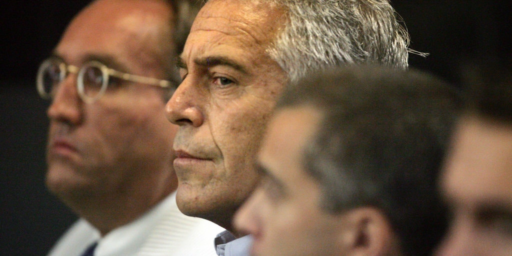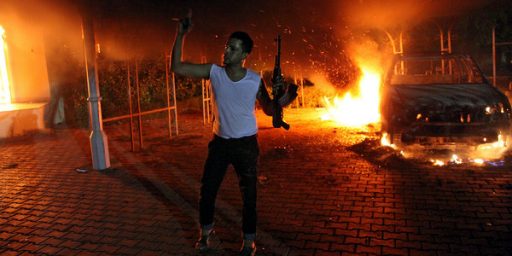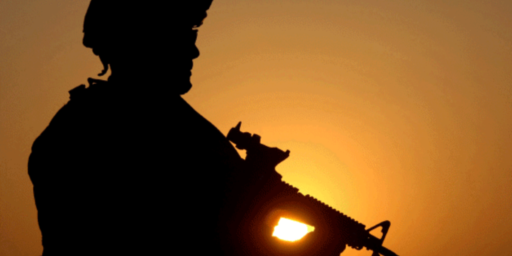TERRORISTS HAVE THE EDGE
RAND’s Bruce Hoffman has an interesting op-ed in yesterday’s LA Times making the obvious but generally overlooked point that the terrorists have the edge.
In this respect, governments are inevitably only as good as their last failure. No matter how many attacks they prevent, no matter how many people are not killed daily by terrorists, what’s remembered is the relatively small number of terrorist attacks that succeed.
There’s no question that the United States and other governments have made significant progress in the war against global terrorism in recent months. Our airports and planes are far better protected. Government buildings are surrounded by new barriers and other security measures. Many terrorists are in prison cells or in graves as a result of counter-terrorism work by the United States and its allies. But all that’s needed is one new, successful attack.
At the end of World War II, the once-mighty armies of Germany and Japan were broken and simply stopped fighting. But despite the crushing defeat in Afghanistan of Al Qaeda and its Taliban allies, terrorist incidents linked to Al Qaeda occurred in the last two years in places as diverse as Tunisia, Pakistan, Jordan, Indonesia, Kuwait, the Philippines, Yemen, Kenya and now possibly Iraq. The terrorist organization has continued to use suicide bombers–at sea and on land. And commercial aviation has remained a significant Al Qaeda target, as July’s warning from the Transportation Security Administration showed.
The problem with a war on terrorism is that there can be no permanent victory. That doesn’t mean we shouldn’t fight it–there’s really no choice–but it does mean that we need to keep some perspective in measuring success.
To draw a close analogy, we don’t say that a police department is failing if there are crimes committed, since we understand that crime will always be with us. The goals are to deter as much crime as possible, punish those who commit crimes, and to elevate public awareness so that they’ll take some simple countermeasures. That’s likely all we can hope from in the Global War on Terrorism.






Well, it’s a police action, not a war. The “war” is failing precisely because it’s being framed as a “war”. Until this meme gets rooted out and purged from the common narrative, there really will be no progress. Only more disasters creating the very thing that we’re trying to solve.
Silly, really. Too bad it’s so dangerous. It would have me on the floor laughing if I wasn’t so terrified.
Ah… so _terminology_ is the root cause of terrorism.
Hmmm….. anyhow, back to the topic… ask yourself why anyone would want the responsibility of “homeland security”? There’s no way to “win”. Even when you bust a potential terrorist cell, it really doesn’t have the headline potential of a “bridge goes down to explosive device”…. and you can just about bet that someone’s wife or mother will be wringing hands in front of cameras about her “innocent” …. Business as usual is the best achievment you can hope for. And when it is business as usual, the people who should be getting credit have little to look forward to beyond being sniped at. It must be a depressing job.
JC- Could you enlighten us?
Since you think the name of the “war on terror” is causing it to fail…
Could you please tell us what proper noun we should call it so that we can all be safe?
Help a poor simpleton out.
—